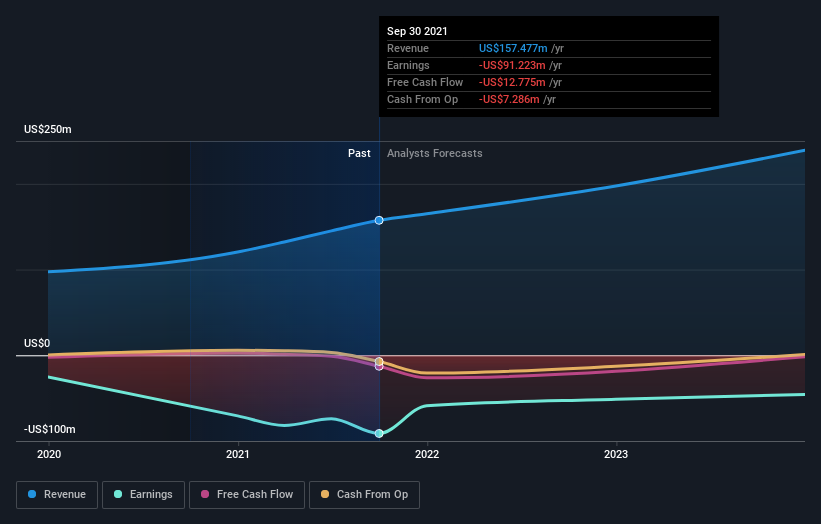- United States
- /
- Software
- /
- NasdaqGS:KLTR
Analysts Just Slashed Their Kaltura, Inc. (NASDAQ:KLTR) EPS Numbers
One thing we could say about the analysts on Kaltura, Inc. (NASDAQ:KLTR) - they aren't optimistic, having just made a major negative revision to their near-term (statutory) forecasts for the organization. Both revenue and earnings per share (EPS) forecasts went under the knife, suggesting analysts have soured majorly on the business.
After this downgrade, Kaltura's eight analysts are now forecasting revenues of US$176m in 2022. This would be a meaningful 12% improvement in sales compared to the last 12 months. Losses are predicted to fall substantially, shrinking 41% to US$0.42. Yet prior to the latest estimates, the analysts had been forecasting revenues of US$210m and losses of US$0.38 per share in 2022. Ergo, there's been a clear change in sentiment, with the analysts administering a notable cut to this year's revenue estimates, while at the same time increasing their loss per share forecasts.
See our latest analysis for Kaltura

The consensus price target fell 61% to US$4.06, implicitly signalling that lower earnings per share are a leading indicator for Kaltura's valuation. There's another way to think about price targets though, and that's to look at the range of price targets put forward by analysts, because a wide range of estimates could suggest a diverse view on possible outcomes for the business. There are some variant perceptions on Kaltura, with the most bullish analyst valuing it at US$15.00 and the most bearish at US$4.00 per share. So we wouldn't be assigning too much credibility to analyst price targets in this case, because there are clearly some widely differing views on what kind of performance this business can generate. With this in mind, we wouldn't rely too heavily on the consensus price target, as it is just an average and analysts clearly have some deeply divergent views on the business.
Taking a look at the bigger picture now, one of the ways we can understand these forecasts is to see how they compare to both past performance and industry growth estimates. It's pretty clear that there is an expectation that Kaltura's revenue growth will slow down substantially, with revenues to the end of 2022 expected to display 12% growth on an annualised basis. This is compared to a historical growth rate of 37% over the past year. By way of comparison, the other companies in this industry with analyst coverage are forecast to grow their revenue at 14% per year. So it's pretty clear that, while revenue growth is expected to slow down, the wider industry is also expected to grow faster than Kaltura.
The Bottom Line
The most important thing to take away is that analysts increased their loss per share estimates for this year. Unfortunately analysts also downgraded their revenue estimates, and industry data suggests that Kaltura's revenues are expected to grow slower than the wider market. Given the scope of the downgrades, it would not be a surprise to see the market become more wary of the business.
With that said, the long-term trajectory of the company's earnings is a lot more important than next year. We have estimates - from multiple Kaltura analysts - going out to 2023, and you can see them free on our platform here.
Another way to search for interesting companies that could be reaching an inflection point is to track whether management are buying or selling, with our free list of growing companies that insiders are buying.
Valuation is complex, but we're here to simplify it.
Discover if Kaltura might be undervalued or overvalued with our detailed analysis, featuring fair value estimates, potential risks, dividends, insider trades, and its financial condition.
Access Free AnalysisHave feedback on this article? Concerned about the content? Get in touch with us directly. Alternatively, email editorial-team (at) simplywallst.com.
This article by Simply Wall St is general in nature. We provide commentary based on historical data and analyst forecasts only using an unbiased methodology and our articles are not intended to be financial advice. It does not constitute a recommendation to buy or sell any stock, and does not take account of your objectives, or your financial situation. We aim to bring you long-term focused analysis driven by fundamental data. Note that our analysis may not factor in the latest price-sensitive company announcements or qualitative material. Simply Wall St has no position in any stocks mentioned.
About NasdaqGS:KLTR
Kaltura
Provides various software-as-a-service (SaaS) products and solutions and a platform-as-a-service (PaaS) in the United States, Europe, the Middle East, Africa, and internationally.
Flawless balance sheet and undervalued.
Similar Companies
Market Insights
Community Narratives




